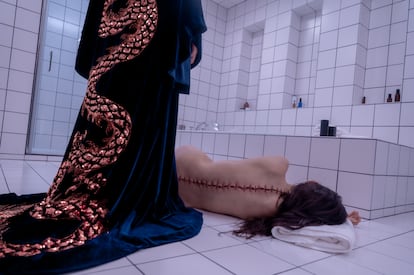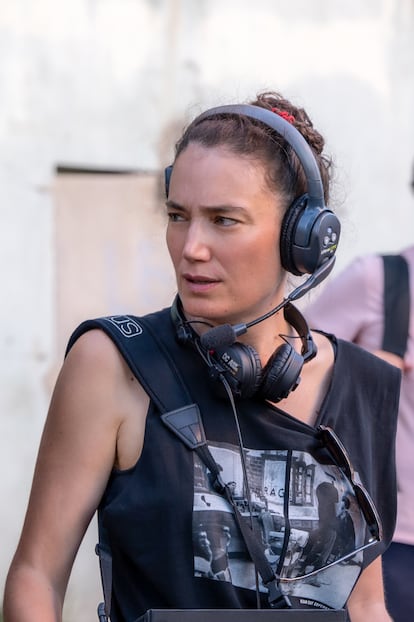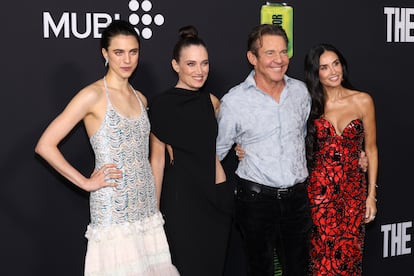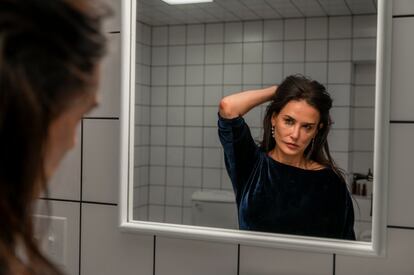Coralie Fargeat, director of ‘The Substance’: ‘Demi Moore was willing to take the risks of exposing herself, of getting naked’
The French director uses the body horror genre to denounce the violence suffered by women in a movie that has relaunched the career of the 1990s Hollywood icon

For as long as she can remember, horror films have fulfilled Coralie Fargeat’s cinematic and cinephile dreams and visions. She cites David Cronenberg and John Carpenter as her greatest influences when she started thinking about becoming a director at the age of 16. Which, even today, adds another step to the difficulties of entering the industry as a woman, of getting a film financed.
That would explain, in part, why 14 years passed between her first short film (Le télégramme, 2003) and her first feature film (Revenge, 2017); and exactly 10 years since her second short, Reality+ (2014), where she was able to look at the themes and forms that interested her, and her second feature, The Substance, which premiered at the Cannes Film Festival and won the award for best screenplay after a 13-minute ovation and widespread gratitude for bringing back an iconic 1990s star in the form of Demi Moore.

“The two films, Reality+ and The Substance, are related because they revolve around the idea that there will always be a better version of you,” explains the director, still euphoric after her movie’s premiere at Cannes. “We always fantasize about being better because everything around you makes you feel like you’re not good enough, or that until you reach perfection, or what you consider perfection, you’ll always be a worse version of yourself.”
Physical, verbal, and emotional violence against women, the effort required, the belittling, the self-hatred and the obstacles that women place on themselves are at the heart of Fargeat’s work, a director who is as eager to provoke as she is to entertain in the hope of generating a small change.
“We didn’t have as many opportunities in the past, but today in French cinema alone there are other directors talking about women and our bodies in different ways, Julia Ducournau [Titane], Noémie Merlant with Les Femmes au balcon… I love that we are having so much impact and the opportunities to relate what we carry inside, but we have to keep breaking down the wall and rebuilding it by putting the bricks back in a different order,” she says with a laugh.

Because, however seriously she speaks, Fargeat doesn’t lose sight of the need to do so through entertainment. “That’s why horror is the best way to talk about certain issues, because it allows you to be excessive, to release your madness,” she explains. The way in which the female body is observed, judged and criticized is violent, “so the body horror genre is the best to show that violence.” Without skimping on blood, guts, or gore.
In The Substance, Moore is a former television fitness star, desperate to continue being viewed with desire. She orders a mysterious product, called “the substance,” which will create (literally) a better and younger version of herself (Margaret Qualley). The movie talks about verbal, psychological, and emotional violence, self-inflicted violence due to the need for validation, even more complicated after reaching 40.
“Dennis Quaid plays the embodiment of that violence. [His character] is a symbol of situations that we still experience, and I didn’t want to cut myself off from that, because those comments and insults are the mirror in which we look at ourselves, and the way in which we torture our bodies is a reflection of that external violence,” Fargeat continues.

The idea for The Substance emerged when, at 40, Fargeat realized that she was letting herself be carried away by dangerous ideas. “I thought that because of my age it was the end, that I would no longer have a place in society, that I no longer mattered to anyone… I am an educated woman, a feminist, and yet these thoughts entered my head,” she reflects. “I wanted to talk about how difficult it is to accept the passage of time, the myth of Dorian Gray taken to all levels. I’m talking about age, but also about not accepting the idea of the perfect body... It’s happened to me at every stage of my life. When you are young your ass isn’t good and your tits aren’t good either, you grow up and your tits look good to you, but another part of your body doesn’t... That comes from what we receive from the outside, from that male gaze that has structured our world. Other gazes have begun to enter the equation, but it’s not enough.”
As soon as she started writing the script, she knew she needed a leading lady who “was a myth and a symbol.” Moore, a 1990s icon, embodied the message of The Substance. “I thought of her after reading her autobiography, which I recommend,” Fargeat says. “I discovered a strong woman, super innovative in her time, intelligent, instinctive, and always out of the ordinary, so I realized that she would understand perfectly that this story that goes beyond the norm.”
Moore accepted the role instantly. “She was willing to take the risks of exposing herself so much, of getting naked; she trusted me and I think she saw right away that I could create something very strong for her as an actress.”
For the star of Striptease and Indecent Proposal, The Substance means a new stage and putting the focus not on her, as a mature woman forgotten by the industry — “not being a victim,” as she said in Cannes — but directing it at the problem itself and those who are responsible for it.
Sign up for our weekly newsletter to get more English-language news coverage from EL PAÍS USA Edition
Tu suscripción se está usando en otro dispositivo
¿Quieres añadir otro usuario a tu suscripción?
Si continúas leyendo en este dispositivo, no se podrá leer en el otro.
FlechaTu suscripción se está usando en otro dispositivo y solo puedes acceder a EL PAÍS desde un dispositivo a la vez.
Si quieres compartir tu cuenta, cambia tu suscripción a la modalidad Premium, así podrás añadir otro usuario. Cada uno accederá con su propia cuenta de email, lo que os permitirá personalizar vuestra experiencia en EL PAÍS.
¿Tienes una suscripción de empresa? Accede aquí para contratar más cuentas.
En el caso de no saber quién está usando tu cuenta, te recomendamos cambiar tu contraseña aquí.
Si decides continuar compartiendo tu cuenta, este mensaje se mostrará en tu dispositivo y en el de la otra persona que está usando tu cuenta de forma indefinida, afectando a tu experiencia de lectura. Puedes consultar aquí los términos y condiciones de la suscripción digital.








































